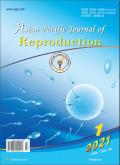Predictors of antenatal health service utilization among left-behind wives of male outmigrants: Evidence from Patna District, India
IF 0.6
Q4 REPRODUCTIVE BIOLOGY
引用次数: 0
Abstract
Objective: To analyze the sociological support system available for left-behind wives of male outmigrants and develop a model that predicts the antenatal care (ANC) services utilization. Methods: A cross-sectional survey was conducted in rural regions of the Patna district, India. The sample size (n=328) was estimated using Cochran's formula. Five parameters of the social support system were identified (autonomy, spousal support, family support, social circle support, and government support). The score for each was calculated as a composite score using multiple variables; these served as independent variables. The respondents were categorized as efficient and non-efficient users of ANC service based on established criteria. Results: The regression results showed that four out of five social parameters had a significant effect on ANC behavior. Spousal support was the strongest predictor (standardized regression coefficient β=0.57, OR 1.16, 95% CI 1.08-1.79, P=0.007). Government support was found to be the second strongest predictor (β=0.40, OR 1.49, 95% CI 1.04-2.14, P=0.027), followed by family support (β=0.31, OR 1.36, 95% CI 1.23-2.57, P=0.034) and autonomy (β=0.11, OR 1.32, 95% CI 1.11-2.26, P=0.030). The social circle support was found to be non-significant in predicting ANC behavior (P>0.05). Conclusions: The policymakers could focus on the identified predictors to strengthen and modify the existing policies for left-behind wives of male outmigrants. The need of the hour is a strategic intervention for behavioral modification of not only the left-behind wives but also their family members along with reinforcement of the existing social-security net. One strategy we suggest is to launch an awareness campaign focusing on husbands (male outmigrants) and family members.外来男性移民的留守妻子产前保健服务利用的预测因素:来自印度巴特那地区的证据
目的:分析外来男性留守妻子可获得的社会支持系统,并建立预测产前保健服务利用的模型。方法:在印度巴特那地区的农村地区进行横断面调查。样本量(n=328)采用科克伦公式估计。确定了社会支持系统的五个参数(自主性、配偶支持、家庭支持、社交圈支持和政府支持)。每一项的得分使用多个变量计算为综合得分;这些作为独立变量。根据既定标准,答复者被分类为ANC服务的高效和非高效用户。结果:回归结果显示,5个社会参数中有4个对非自主行为有显著影响。配偶支持是最强的预测因子(标准化回归系数β=0.57, OR 1.16, 95% CI 1.08-1.79, P=0.007)。政府支持是第二大预测因子(β=0.40, OR 1.49, 95% CI 1.04-2.14, P=0.027),其次是家庭支持(β=0.31, OR 1.36, 95% CI 1.23-2.57, P=0.034)和自主性(β=0.11, OR 1.32, 95% CI 1.11-2.26, P=0.030)。社交圈支持对ANC行为的预测不显著(P < 0.05)。结论:政策制定者应关注已识别的预测因素,加强和修改现有的外来男性留守妻子政策。时间的需要是一种战略干预,不仅是为了改变留守妇女的行为,也是为了改善她们的家庭成员的行为,同时加强现有的社会保障网络。我们建议的一个策略是发起一场关注丈夫(男性外迁者)和家庭成员的意识运动。
本文章由计算机程序翻译,如有差异,请以英文原文为准。
求助全文
约1分钟内获得全文
求助全文
来源期刊

Asian Pacific Journal of Reproduction
Veterinary-Veterinary (all)
CiteScore
1.70
自引率
0.00%
发文量
588
审稿时长
9 weeks
期刊介绍:
The journal will cover technical and clinical studies related to health, ethical and social issues in field of Gynecology and Obstetrics. Articles with clinical interest and implications will be given preference.
 求助内容:
求助内容: 应助结果提醒方式:
应助结果提醒方式:


